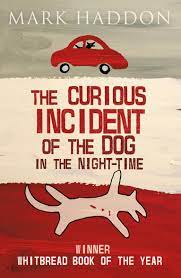“Prime numbers are like life.
They are very logical but you could never work out the rules, even if you spent
all your time thinking about them.” The narrator-protagonist of Mark Haddon’s
novel, The Curious Incident of the Dog in the Night-time, makes
that captivating observation. 15-year-old Christopher loves numbers and has a
way with them. For example, ask him ‘What’s 251 times 864?’ and he’ll tell you
in a moment the answer: 216,864. It’s easy, he will tell you, you just multiply
864 x 1000 which is 864,000. Then you divide it by 4 which is 216,000 and that’s
250 x 864. Then you just add another 864 on to it to get 251 x 864. And that’s
216,864. He’s good at science too. What he’s not good at is
understanding people.
People are
more complicated than maths and science. They tell lies. They have complex
emotions and motives. And beliefs. Christopher tells us that he cannot tell
lies, ‘not because I am a good person. It is because I can’t tell
lies.’ His mind is too logical to deal with falsehood. Is that a merit or a
drawback? Well, ‘normal’ people would think of it as a drawback. After all,
Christopher is a patient of a particular variety of autism.
Ordinary
people like you and me tell lies every day. Life would be impossible otherwise.
Just imagine as simple a situation as someone asking you ‘How are you?’ You have
just swallowed a pill for the headache that’s killing you. But you are not
going to tell that in response to a casual ‘How are you?’ There are a million
things that we won’t tell others. There are a million truths that die every
moment on the earth. There are more truths that are distorted every moment.
‘Life is
difficult, you know,’ Christopher is told by his father. ‘It’s bloody hard
telling the truth all the time. Sometimes it’s impossible.’ If you want only
truths, it’s better you confine yourself to maths and science. Mr Jeavons, the
psychologist at Christopher’s school, tells that in a pleasant way. The
problems in maths are difficult and interesting, he says, there are always
straightforward answers to them in the end. Not so in life. There are no
straightforward answers to the problems that life brings.
Christopher
thinks Mr Jeavons is saying that because he is incapable of understanding
numbers. Mr Jeavons thinks that Christopher is incapable of understanding the
complexity of human emotions and motives.
Dogs are
better than human beings, Christopher would say. ‘You always know what a dog is
thinking. It has four moods. Happy, sad, cross and concentrating. Also, dogs
are faithful and they do not tell lies because they cannot talk.’
Even if dogs
could talk, would they tell lies? Would they be incapable of telling lies even
as Christopher is?
Does
falsehood belong to the ‘wise’ human species?
Christopher
is incapable of conceiving falsehood and telling lies. But he can be irrational
sometimes. For example, he loves red colour and hates yellow. So if he sees
four red cars in a row on the way to school, he thinks it’s going to be a good
day. If he sees yellow cars instead, it would be a bad day. His moods do change
according to the cars he sees on the way. Later when he is in London city where
too many cars come and go his belief is shaken. Christopher questions his beliefs.
The ‘wiser, normal’ people won’t, however. They will keep on believing that a
sunny day keeps them cheerful while a rainy day makes them gloomy.
At the end of
the novel, Christopher remains happy with his maths and science. He leaves us
to our own complications. Our emotions and motives – which we consider as
normal and hence sane – are far more complex than the abstract equations in algebra
or physics. The wise reader will be left pondering, poised between Christopher’s
autism and the ‘normal’ people’s sanity.

Hari OM
ReplyDeleteA great review for a wonderful book - I read it some time back and it is one of those you won't forget because it does exactly as you say - invites self-reflection and the desire to think more. YAM xx
When new arrivals were exhausted, I picked up this once again from the shelf. It's worth a second read.
DeleteInteresting.
ReplyDeleteThank you
Deletewonderful review you have wanting to pick up the book.
ReplyDeleteYou will love it. It sets you thinking in a different direction altogether.
Delete👏 +
ReplyDelete👍👍
DeleteThanks for sharing this intriguing post! Happy driving!
ReplyDelete